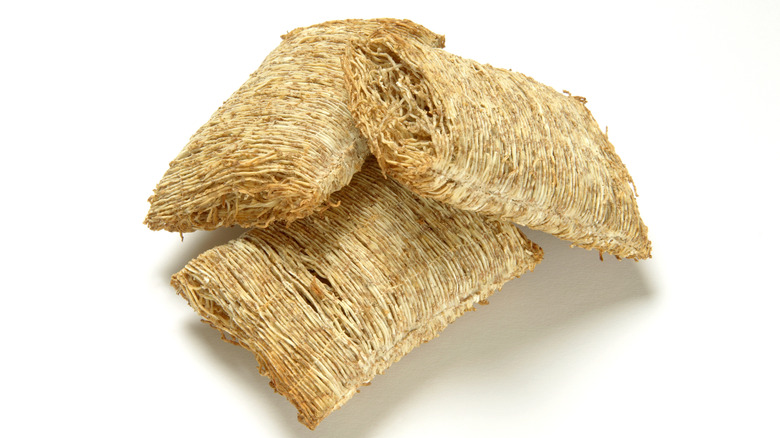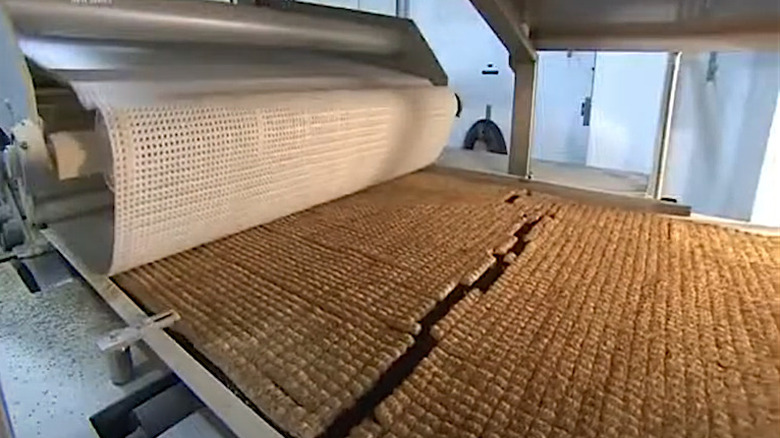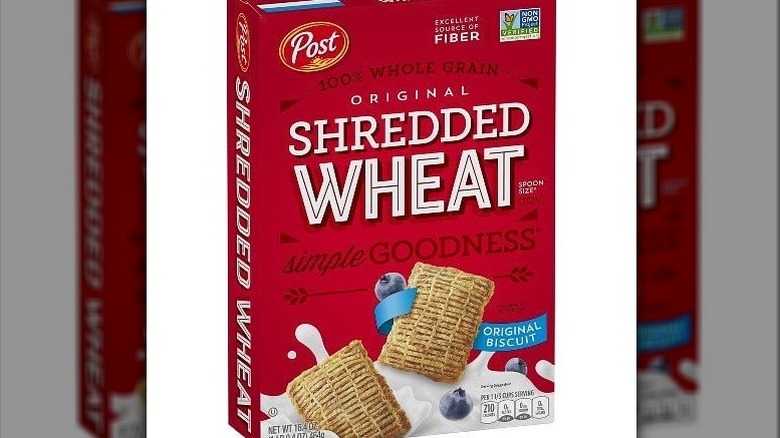The Rise Of Shredded Wheat Cereal Began With A Denver Lawyer
There's nothing sexy about original shredded wheat. The old-timey breakfast food doesn't pop with bits of fruit. There's no frosted glaze. And with one notable exception, it's never had a celebrity spokesperson. It's just wheat. That's been shredded. And dried. And shaped into biscuits that look like little bales of hay. Still, the first mass-produced ready-to-eat cereal remains a stalwart choice among the dozens upon dozens of flashier brands that line the cereal aisle in grocery stores across the country.
Even its origin story is rooted in practicality, but its staying power may be a reflection of its inventor's tenacity. Conceived in 1891 by lawyer-turned-entrepreneur Henry Perky, shredded wheat was invented as a digestion aid. In his 2006 book, "Henry Perky: The Shredded Wheat King," author Jim Holechek describes Perky as an eccentric businessman who was always on the lookout for his next big deal. At the same time, he was a humanitarian who believed the purpose of accumulating wealth was to distribute it among those less fortunate (via The Baltimore Sun).
In addition to practicing law, Perky was a teacher and an investor with wide-ranging business interests, including a company that built all-steel railroad cars. With so much going on, it's no wonder Perky suffered chronic stomach ailments — which is what led him to create shredded wheat biscuits. According to legend, Perky was in Denver, Colorado on a sales trip when he noticed a fellow diner tucking into a bowl of boiled wheat blended with cream.
An unexpected connection to Ford
Intrigued, Perky set out to develop a method to process wheat into the breakfast biscuits we know today. At the time, Perky was living with his wife and son in Cambridge, Massachusetts. When he returned from his business trip, he began experimenting with ways to make the wheat more palatable. Early attempts involved spreading boiled wheat on a grooved plate and weighing it down with a heavier plate to squeeze out excess water, then baking the wheat filaments. According to Holedek's research, Perkey eventually turned to none other than William Henry Ford, for advice on creating a machine to do the work and to shape the resulting filaments into biscuits. In 1895, Perky and Ford secured utility patents for both the machine and the product.
With a method in place, Perky set up shop, establishing the Cereal Machine Co. (later known as the Shredded Wheat Co.). His first manufacturing facility was in the basement of a Denver home, followed by a plant in Worcester, Massachusetts, and eventually expanding to Niagara Falls, New York. Everything was going his way. Shredded wheat gained a loyal following, opening the door for other ready-to-serve cereals created by Kellogg and Post.
The one and only original
Shredded wheat was so popular that Kellogg offered to buy Perky's patent for $100,000, but Perky was having none of it. That may have been the beginning of the end of his short reign as a cereal king. In 1901, the board of the company Perky created forced him to sell his interest in the venture for just $150,000. Perky died at age 62 in 1906. His patents expired in 1912.
With the door open, other companies began manufacturing their own versions of shredded wheat. Legal challenges and appeals ensued, even pausing production by other companies for a while, but eventually, a Supreme Court ruling determined the term shredded wheat had become part of the public lexicon and, as such, no longer qualified for trademark status. Ditto for the pillow-like shape of the biscuits, which was ruled functional and not distinctive.
These days, there are dozens of varieties of shredded wheat-based cereals on grocery store shelves, and they're all dolled up to compete with the flashier brands of flakes, rice, oats, you name it. But there's only one original shredded wheat — unadorned by sugar, flavoring, frosting, or fruit filling. It comes in basic beige, and it's still good for digestion. Oh, about that celebrity spokesperson — it was actually two. In the late 1980s and early 1990s, the Smothers Brothers, a folk-singing comedy duo, did a series of television commercials for Nabisco's shredded wheat.


